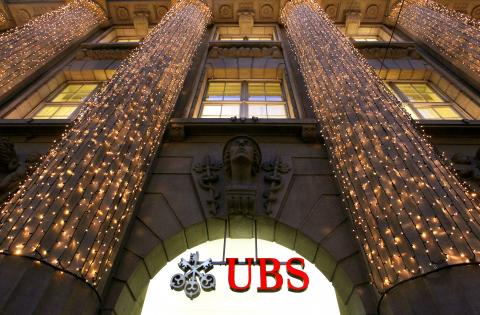US prosecutors are planning to file charges next week against multiple bankers associated with UBS AG’s rigging of Tokyo interbank lending rates, according to a person with knowledge of the case.
The charges would be the first brought by the US Justice Department against individuals alleged to have manipulated the London Interbank Offered Rate, or LIBOR, a rate used in bank borrowing, and comparable lending rates in Europe and Japan.
The prosecution is slated to begin in tandem with an announcement that UBS Securities Japan Ltd, the Japanese subsidiary of the Zurich-based bank, would plead guilty to manipulating Japanese interest rates starting in 2007, said the person, who asked not to be named because the matter is private.

Photo: Reuters
UBS is set to pay more than US$1 billion to settle charges of interest rate manipulation with the US Justice Department, the US Commodity Futures Trading Commission, the UK Financial Services Authority and the Swiss Financial Market Supervisory Authority, said two people familiar with the matter, including the person with knowledge of the plans to charge individuals.
That US$1 billion-plus sum is more than twice the £290 million (US$469 million) that Barclays PLC agreed to pay last June to settle allegations that its employees conspired to manipulate LIBOR.
Unlike the pending settlement with UBS, the Justice Department did not require Barclays to enter a guilty plea to a specific charge.
In deciding against a charge last June, prosecutors praised Barclays’ “timely, voluntary and complete disclosure of facts.”
UBS has been “granted conditional leniency or conditional immunity” by the Justice Department’s antitrust division, in connection with potential antitrust violations related to submissions for interbank lending rates in Tokyo, according to the Swiss bank’s most recent annual report,
According to Justice Department guidelines, a corporation can secure favorable treatment from prosecutors if it is the first to pledge full cooperation in an antitrust investigation.
However, in order to win that leniency, the corporation has to include an admission that it was part of an antitrust conspiracy, and help identify other participants in the scheme.
One year ago, Japanese regulators sanctioned UBS’ Japanese operations, curtailing the bank’s ability to participate in the Tokyo interbank derivative market for a week, and ordering the bank to improve its regime of compliance and internal controls.
Earlier this week, a former Citigroup Inc trader was among three people detained in the first UK arrests as part of the global LIBOR probes, according to two people familiar with the matter.
Thomas Hayes, a former trader at UBS and Citigroup, was arrested by the Serious Fraud Office and City of London Police, said the people, who asked not to be identified citing the continuing investigation.
The other two men arrested worked at brokerage firm RP Martin Holdings Ltd, according to one of the people and a third person familiar with the investigation, who also requested anonymity.
The employees are Terry Farr and Jim Gilmour, people with knowledge of the investigation said.
They were later released on bail.

WEAKER ACTIVITY: The sharpest deterioration was seen in the electronics and optical components sector, with the production index falling 13.2 points to 44.5 Taiwan’s manufacturing sector last month contracted for a second consecutive month, with the purchasing managers’ index (PMI) slipping to 48, reflecting ongoing caution over trade uncertainties, the Chung-Hua Institution for Economic Research (CIER, 中華經濟研究院) said yesterday. The decline reflects growing caution among companies amid uncertainty surrounding US tariffs, semiconductor duties and automotive import levies, and it is also likely linked to fading front-loading activity, CIER president Lien Hsien-ming (連賢明) said. “Some clients have started shifting orders to Southeast Asian countries where tariff regimes are already clear,” Lien told a news conference. Firms across the supply chain are also lowering stock levels to mitigate

Six Taiwanese companies, including contract chipmaker Taiwan Semiconductor Manufacturing Co (TSMC, 台積電), made the 2025 Fortune Global 500 list of the world’s largest firms by revenue. In a report published by New York-based Fortune magazine on Tuesday, Hon Hai Precision Industry Co (鴻海精密), also known as Foxconn Technology Group (富士康科技集團), ranked highest among Taiwanese firms, placing 28th with revenue of US$213.69 billion. Up 60 spots from last year, TSMC rose to No. 126 with US$90.16 billion in revenue, followed by Quanta Computer Inc (廣達) at 348th, Pegatron Corp (和碩) at 461st, CPC Corp, Taiwan (台灣中油) at 494th and Wistron Corp (緯創) at

NEGOTIATIONS: Semiconductors play an outsized role in Taiwan’s industrial and economic development and are a major driver of the Taiwan-US trade imbalance With US President Donald Trump threatening to impose tariffs on semiconductors, Taiwan is expected to face a significant challenge, as information and communications technology (ICT) products account for more than 70 percent of its exports to the US, Chung-Hua Institution for Economic Research (CIER, 中華經濟研究院) president Lien Hsien-ming (連賢明) said on Friday. Compared with other countries, semiconductors play a disproportionately large role in Taiwan’s industrial and economic development, Lien said. As the sixth-largest contributor to the US trade deficit, Taiwan recorded a US$73.9 billion trade surplus with the US last year — up from US$47.8 billion in 2023 — driven by strong

ASE Technology Holding Co (ASE, 日月光投控), the world’s biggest chip assembly and testing service provider, yesterday said it would boost equipment capital expenditure by up to 16 percent for this year to cope with strong customer demand for artificial intelligence (AI) applications. Aside from AI, a growing demand for semiconductors used in the automotive and industrial sectors is to drive ASE’s capacity next year, the Kaohsiung-based company said. “We do see the disparity between AI and other general sectors, and that pretty much aligns the scenario in the first half of this year,” ASE chief operating officer Tien Wu (吳田玉) told an